Entrepreneurship Education and Intentions
VerifiedAdded on 2020/02/17
|11
|5115
|119
AI Summary
This assignment requires an analysis of the relationship between entrepreneurship education and entrepreneurial intentions. It specifically asks you to examine a meta-analytic review that explores this connection. You'll need to understand the findings of the review and discuss its implications for understanding how education influences individuals' likelihood of pursuing entrepreneurial ventures.
Contribute Materials
Your contribution can guide someone’s learning journey. Share your
documents today.
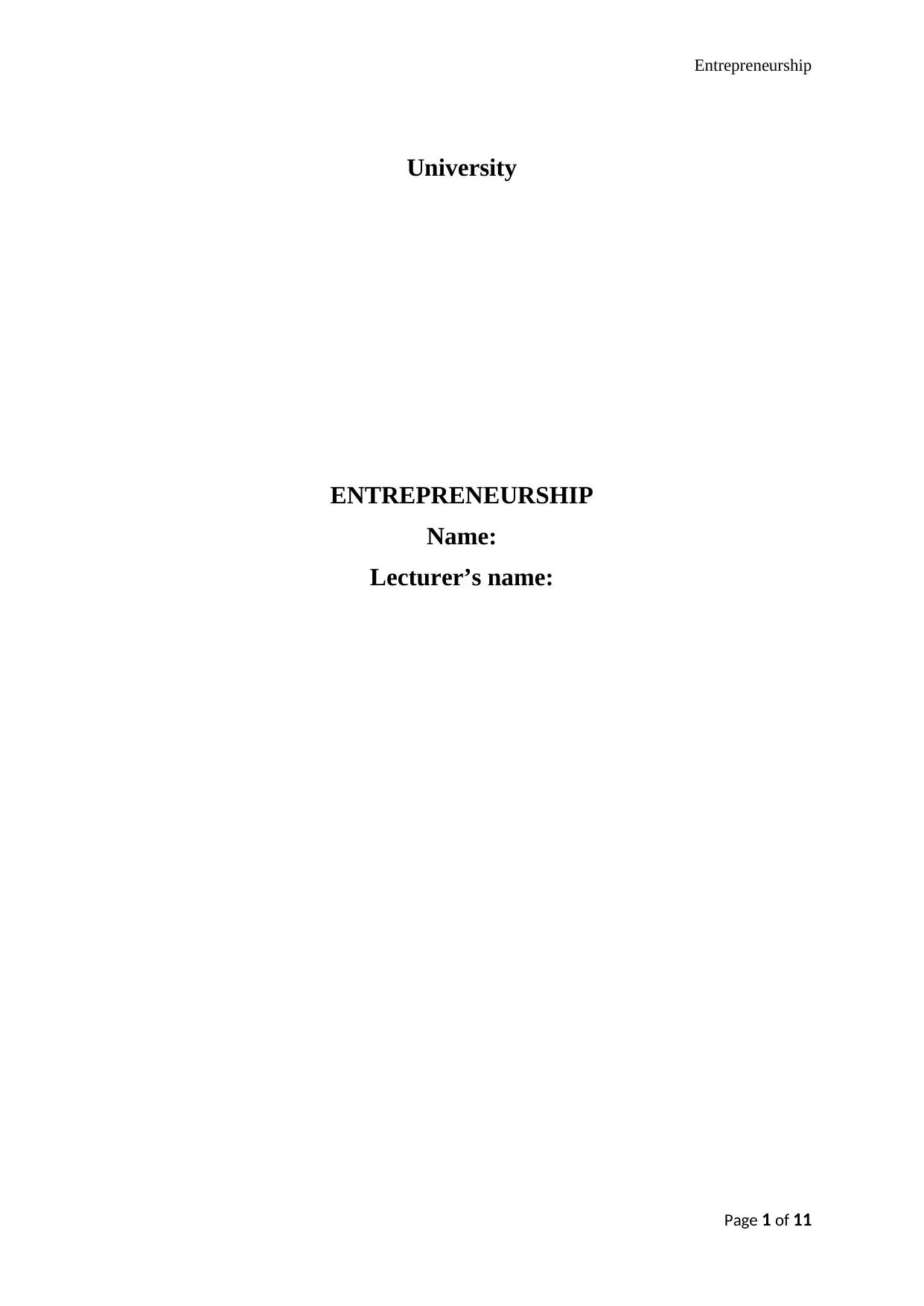
Entrepreneurship
University
ENTREPRENEURSHIP
Name:
Lecturer’s name:
Page 1 of 11
University
ENTREPRENEURSHIP
Name:
Lecturer’s name:
Page 1 of 11
Secure Best Marks with AI Grader
Need help grading? Try our AI Grader for instant feedback on your assignments.

Entrepreneurship
Executive summary
The paper contains a report on the entrepreneurship and the related topic. The paper first talks
about the different kinds of ventures that can be regarded as entrepreneurships. It also
contains an assessment on how these small businesses and the entrepreneurship impact the
economy taking the case of the UK. After that it talks about the entrepreneurial mind-sets
along with a discussion of two of successful entrepreneurs of the world. Lastly, the paper
concludes with the discussion of how environment, experiences and the background hinders
or fosters the growth of the environment.
Page 2 of 11
Executive summary
The paper contains a report on the entrepreneurship and the related topic. The paper first talks
about the different kinds of ventures that can be regarded as entrepreneurships. It also
contains an assessment on how these small businesses and the entrepreneurship impact the
economy taking the case of the UK. After that it talks about the entrepreneurial mind-sets
along with a discussion of two of successful entrepreneurs of the world. Lastly, the paper
concludes with the discussion of how environment, experiences and the background hinders
or fosters the growth of the environment.
Page 2 of 11
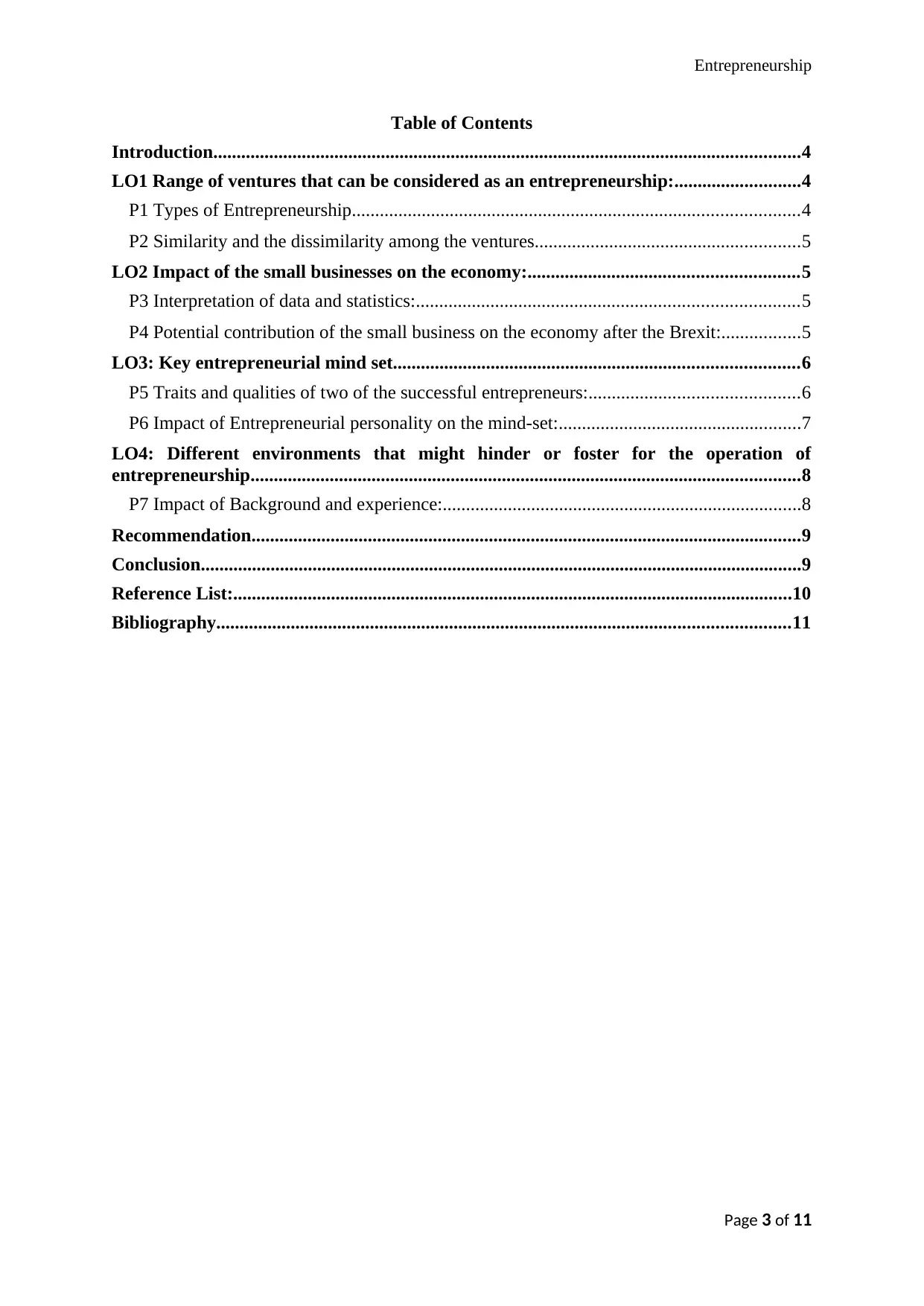
Entrepreneurship
Table of Contents
Introduction..............................................................................................................................4
LO1 Range of ventures that can be considered as an entrepreneurship:...........................4
P1 Types of Entrepreneurship................................................................................................4
P2 Similarity and the dissimilarity among the ventures.........................................................5
LO2 Impact of the small businesses on the economy:..........................................................5
P3 Interpretation of data and statistics:..................................................................................5
P4 Potential contribution of the small business on the economy after the Brexit:.................5
LO3: Key entrepreneurial mind set.......................................................................................6
P5 Traits and qualities of two of the successful entrepreneurs:.............................................6
P6 Impact of Entrepreneurial personality on the mind-set:....................................................7
LO4: Different environments that might hinder or foster for the operation of
entrepreneurship......................................................................................................................8
P7 Impact of Background and experience:.............................................................................8
Recommendation......................................................................................................................9
Conclusion.................................................................................................................................9
Reference List:........................................................................................................................10
Bibliography...........................................................................................................................11
Page 3 of 11
Table of Contents
Introduction..............................................................................................................................4
LO1 Range of ventures that can be considered as an entrepreneurship:...........................4
P1 Types of Entrepreneurship................................................................................................4
P2 Similarity and the dissimilarity among the ventures.........................................................5
LO2 Impact of the small businesses on the economy:..........................................................5
P3 Interpretation of data and statistics:..................................................................................5
P4 Potential contribution of the small business on the economy after the Brexit:.................5
LO3: Key entrepreneurial mind set.......................................................................................6
P5 Traits and qualities of two of the successful entrepreneurs:.............................................6
P6 Impact of Entrepreneurial personality on the mind-set:....................................................7
LO4: Different environments that might hinder or foster for the operation of
entrepreneurship......................................................................................................................8
P7 Impact of Background and experience:.............................................................................8
Recommendation......................................................................................................................9
Conclusion.................................................................................................................................9
Reference List:........................................................................................................................10
Bibliography...........................................................................................................................11
Page 3 of 11
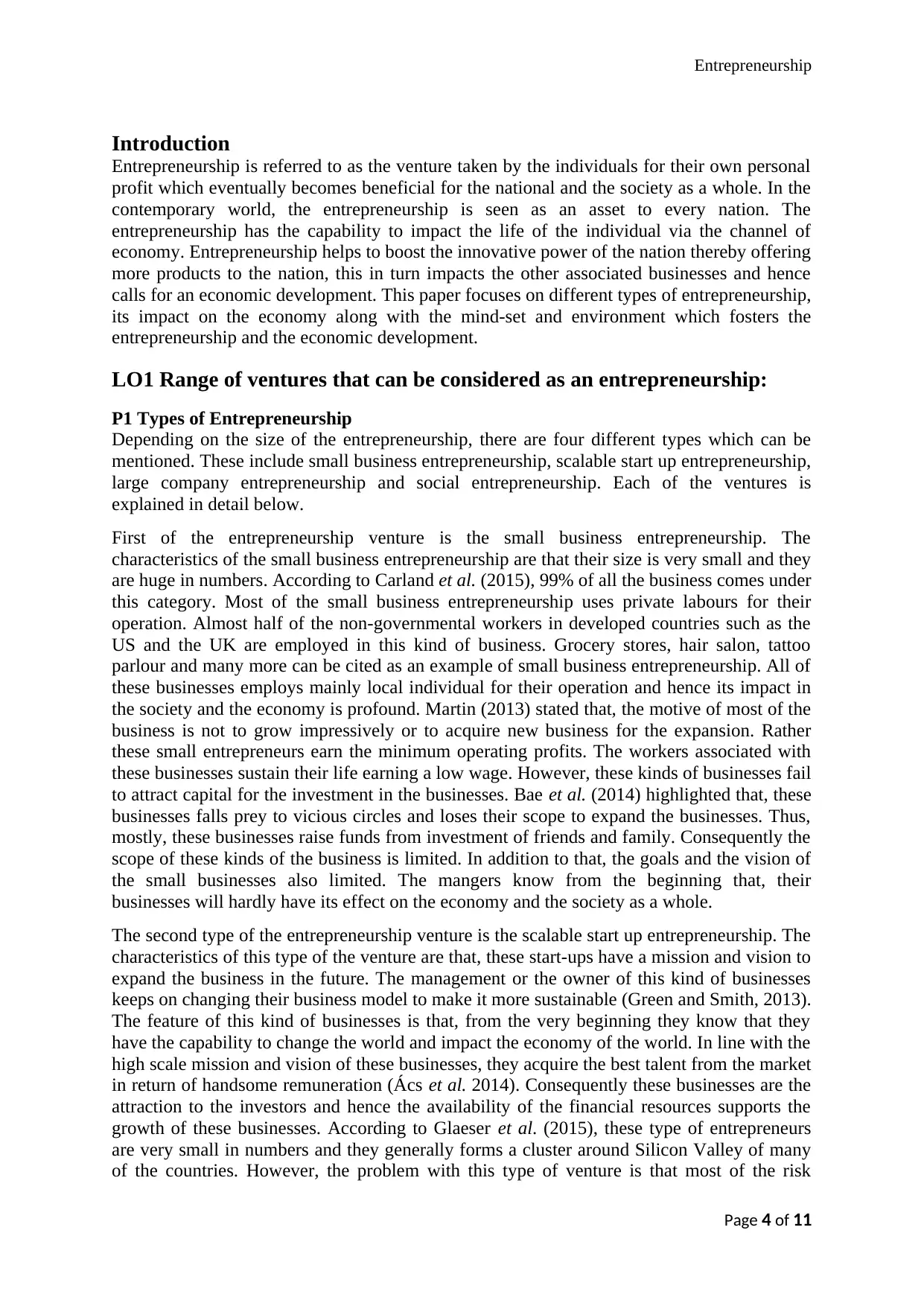
Entrepreneurship
Introduction
Entrepreneurship is referred to as the venture taken by the individuals for their own personal
profit which eventually becomes beneficial for the national and the society as a whole. In the
contemporary world, the entrepreneurship is seen as an asset to every nation. The
entrepreneurship has the capability to impact the life of the individual via the channel of
economy. Entrepreneurship helps to boost the innovative power of the nation thereby offering
more products to the nation, this in turn impacts the other associated businesses and hence
calls for an economic development. This paper focuses on different types of entrepreneurship,
its impact on the economy along with the mind-set and environment which fosters the
entrepreneurship and the economic development.
LO1 Range of ventures that can be considered as an entrepreneurship:
P1 Types of Entrepreneurship
Depending on the size of the entrepreneurship, there are four different types which can be
mentioned. These include small business entrepreneurship, scalable start up entrepreneurship,
large company entrepreneurship and social entrepreneurship. Each of the ventures is
explained in detail below.
First of the entrepreneurship venture is the small business entrepreneurship. The
characteristics of the small business entrepreneurship are that their size is very small and they
are huge in numbers. According to Carland et al. (2015), 99% of all the business comes under
this category. Most of the small business entrepreneurship uses private labours for their
operation. Almost half of the non-governmental workers in developed countries such as the
US and the UK are employed in this kind of business. Grocery stores, hair salon, tattoo
parlour and many more can be cited as an example of small business entrepreneurship. All of
these businesses employs mainly local individual for their operation and hence its impact in
the society and the economy is profound. Martin (2013) stated that, the motive of most of the
business is not to grow impressively or to acquire new business for the expansion. Rather
these small entrepreneurs earn the minimum operating profits. The workers associated with
these businesses sustain their life earning a low wage. However, these kinds of businesses fail
to attract capital for the investment in the businesses. Bae et al. (2014) highlighted that, these
businesses falls prey to vicious circles and loses their scope to expand the businesses. Thus,
mostly, these businesses raise funds from investment of friends and family. Consequently the
scope of these kinds of the business is limited. In addition to that, the goals and the vision of
the small businesses also limited. The mangers know from the beginning that, their
businesses will hardly have its effect on the economy and the society as a whole.
The second type of the entrepreneurship venture is the scalable start up entrepreneurship. The
characteristics of this type of the venture are that, these start-ups have a mission and vision to
expand the business in the future. The management or the owner of this kind of businesses
keeps on changing their business model to make it more sustainable (Green and Smith, 2013).
The feature of this kind of businesses is that, from the very beginning they know that they
have the capability to change the world and impact the economy of the world. In line with the
high scale mission and vision of these businesses, they acquire the best talent from the market
in return of handsome remuneration (Ács et al. 2014). Consequently these businesses are the
attraction to the investors and hence the availability of the financial resources supports the
growth of these businesses. According to Glaeser et al. (2015), these type of entrepreneurs
are very small in numbers and they generally forms a cluster around Silicon Valley of many
of the countries. However, the problem with this type of venture is that most of the risk
Page 4 of 11
Introduction
Entrepreneurship is referred to as the venture taken by the individuals for their own personal
profit which eventually becomes beneficial for the national and the society as a whole. In the
contemporary world, the entrepreneurship is seen as an asset to every nation. The
entrepreneurship has the capability to impact the life of the individual via the channel of
economy. Entrepreneurship helps to boost the innovative power of the nation thereby offering
more products to the nation, this in turn impacts the other associated businesses and hence
calls for an economic development. This paper focuses on different types of entrepreneurship,
its impact on the economy along with the mind-set and environment which fosters the
entrepreneurship and the economic development.
LO1 Range of ventures that can be considered as an entrepreneurship:
P1 Types of Entrepreneurship
Depending on the size of the entrepreneurship, there are four different types which can be
mentioned. These include small business entrepreneurship, scalable start up entrepreneurship,
large company entrepreneurship and social entrepreneurship. Each of the ventures is
explained in detail below.
First of the entrepreneurship venture is the small business entrepreneurship. The
characteristics of the small business entrepreneurship are that their size is very small and they
are huge in numbers. According to Carland et al. (2015), 99% of all the business comes under
this category. Most of the small business entrepreneurship uses private labours for their
operation. Almost half of the non-governmental workers in developed countries such as the
US and the UK are employed in this kind of business. Grocery stores, hair salon, tattoo
parlour and many more can be cited as an example of small business entrepreneurship. All of
these businesses employs mainly local individual for their operation and hence its impact in
the society and the economy is profound. Martin (2013) stated that, the motive of most of the
business is not to grow impressively or to acquire new business for the expansion. Rather
these small entrepreneurs earn the minimum operating profits. The workers associated with
these businesses sustain their life earning a low wage. However, these kinds of businesses fail
to attract capital for the investment in the businesses. Bae et al. (2014) highlighted that, these
businesses falls prey to vicious circles and loses their scope to expand the businesses. Thus,
mostly, these businesses raise funds from investment of friends and family. Consequently the
scope of these kinds of the business is limited. In addition to that, the goals and the vision of
the small businesses also limited. The mangers know from the beginning that, their
businesses will hardly have its effect on the economy and the society as a whole.
The second type of the entrepreneurship venture is the scalable start up entrepreneurship. The
characteristics of this type of the venture are that, these start-ups have a mission and vision to
expand the business in the future. The management or the owner of this kind of businesses
keeps on changing their business model to make it more sustainable (Green and Smith, 2013).
The feature of this kind of businesses is that, from the very beginning they know that they
have the capability to change the world and impact the economy of the world. In line with the
high scale mission and vision of these businesses, they acquire the best talent from the market
in return of handsome remuneration (Ács et al. 2014). Consequently these businesses are the
attraction to the investors and hence the availability of the financial resources supports the
growth of these businesses. According to Glaeser et al. (2015), these type of entrepreneurs
are very small in numbers and they generally forms a cluster around Silicon Valley of many
of the countries. However, the problem with this type of venture is that most of the risk
Page 4 of 11
Secure Best Marks with AI Grader
Need help grading? Try our AI Grader for instant feedback on your assignments.
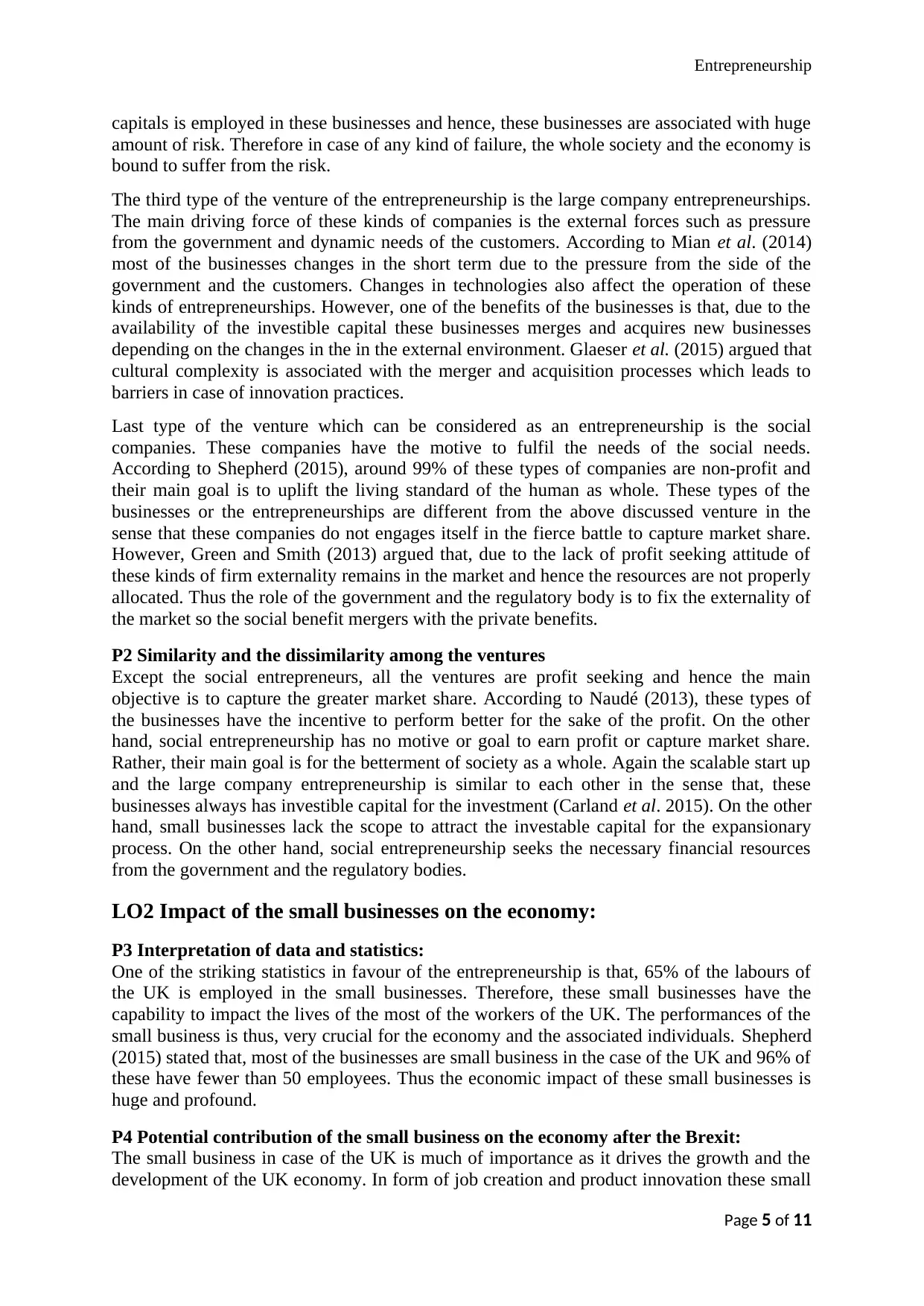
Entrepreneurship
capitals is employed in these businesses and hence, these businesses are associated with huge
amount of risk. Therefore in case of any kind of failure, the whole society and the economy is
bound to suffer from the risk.
The third type of the venture of the entrepreneurship is the large company entrepreneurships.
The main driving force of these kinds of companies is the external forces such as pressure
from the government and dynamic needs of the customers. According to Mian et al. (2014)
most of the businesses changes in the short term due to the pressure from the side of the
government and the customers. Changes in technologies also affect the operation of these
kinds of entrepreneurships. However, one of the benefits of the businesses is that, due to the
availability of the investible capital these businesses merges and acquires new businesses
depending on the changes in the in the external environment. Glaeser et al. (2015) argued that
cultural complexity is associated with the merger and acquisition processes which leads to
barriers in case of innovation practices.
Last type of the venture which can be considered as an entrepreneurship is the social
companies. These companies have the motive to fulfil the needs of the social needs.
According to Shepherd (2015), around 99% of these types of companies are non-profit and
their main goal is to uplift the living standard of the human as whole. These types of the
businesses or the entrepreneurships are different from the above discussed venture in the
sense that these companies do not engages itself in the fierce battle to capture market share.
However, Green and Smith (2013) argued that, due to the lack of profit seeking attitude of
these kinds of firm externality remains in the market and hence the resources are not properly
allocated. Thus the role of the government and the regulatory body is to fix the externality of
the market so the social benefit mergers with the private benefits.
P2 Similarity and the dissimilarity among the ventures
Except the social entrepreneurs, all the ventures are profit seeking and hence the main
objective is to capture the greater market share. According to Naudé (2013), these types of
the businesses have the incentive to perform better for the sake of the profit. On the other
hand, social entrepreneurship has no motive or goal to earn profit or capture market share.
Rather, their main goal is for the betterment of society as a whole. Again the scalable start up
and the large company entrepreneurship is similar to each other in the sense that, these
businesses always has investible capital for the investment (Carland et al. 2015). On the other
hand, small businesses lack the scope to attract the investable capital for the expansionary
process. On the other hand, social entrepreneurship seeks the necessary financial resources
from the government and the regulatory bodies.
LO2 Impact of the small businesses on the economy:
P3 Interpretation of data and statistics:
One of the striking statistics in favour of the entrepreneurship is that, 65% of the labours of
the UK is employed in the small businesses. Therefore, these small businesses have the
capability to impact the lives of the most of the workers of the UK. The performances of the
small business is thus, very crucial for the economy and the associated individuals. Shepherd
(2015) stated that, most of the businesses are small business in the case of the UK and 96% of
these have fewer than 50 employees. Thus the economic impact of these small businesses is
huge and profound.
P4 Potential contribution of the small business on the economy after the Brexit:
The small business in case of the UK is much of importance as it drives the growth and the
development of the UK economy. In form of job creation and product innovation these small
Page 5 of 11
capitals is employed in these businesses and hence, these businesses are associated with huge
amount of risk. Therefore in case of any kind of failure, the whole society and the economy is
bound to suffer from the risk.
The third type of the venture of the entrepreneurship is the large company entrepreneurships.
The main driving force of these kinds of companies is the external forces such as pressure
from the government and dynamic needs of the customers. According to Mian et al. (2014)
most of the businesses changes in the short term due to the pressure from the side of the
government and the customers. Changes in technologies also affect the operation of these
kinds of entrepreneurships. However, one of the benefits of the businesses is that, due to the
availability of the investible capital these businesses merges and acquires new businesses
depending on the changes in the in the external environment. Glaeser et al. (2015) argued that
cultural complexity is associated with the merger and acquisition processes which leads to
barriers in case of innovation practices.
Last type of the venture which can be considered as an entrepreneurship is the social
companies. These companies have the motive to fulfil the needs of the social needs.
According to Shepherd (2015), around 99% of these types of companies are non-profit and
their main goal is to uplift the living standard of the human as whole. These types of the
businesses or the entrepreneurships are different from the above discussed venture in the
sense that these companies do not engages itself in the fierce battle to capture market share.
However, Green and Smith (2013) argued that, due to the lack of profit seeking attitude of
these kinds of firm externality remains in the market and hence the resources are not properly
allocated. Thus the role of the government and the regulatory body is to fix the externality of
the market so the social benefit mergers with the private benefits.
P2 Similarity and the dissimilarity among the ventures
Except the social entrepreneurs, all the ventures are profit seeking and hence the main
objective is to capture the greater market share. According to Naudé (2013), these types of
the businesses have the incentive to perform better for the sake of the profit. On the other
hand, social entrepreneurship has no motive or goal to earn profit or capture market share.
Rather, their main goal is for the betterment of society as a whole. Again the scalable start up
and the large company entrepreneurship is similar to each other in the sense that, these
businesses always has investible capital for the investment (Carland et al. 2015). On the other
hand, small businesses lack the scope to attract the investable capital for the expansionary
process. On the other hand, social entrepreneurship seeks the necessary financial resources
from the government and the regulatory bodies.
LO2 Impact of the small businesses on the economy:
P3 Interpretation of data and statistics:
One of the striking statistics in favour of the entrepreneurship is that, 65% of the labours of
the UK is employed in the small businesses. Therefore, these small businesses have the
capability to impact the lives of the most of the workers of the UK. The performances of the
small business is thus, very crucial for the economy and the associated individuals. Shepherd
(2015) stated that, most of the businesses are small business in the case of the UK and 96% of
these have fewer than 50 employees. Thus the economic impact of these small businesses is
huge and profound.
P4 Potential contribution of the small business on the economy after the Brexit:
The small business in case of the UK is much of importance as it drives the growth and the
development of the UK economy. In form of job creation and product innovation these small
Page 5 of 11
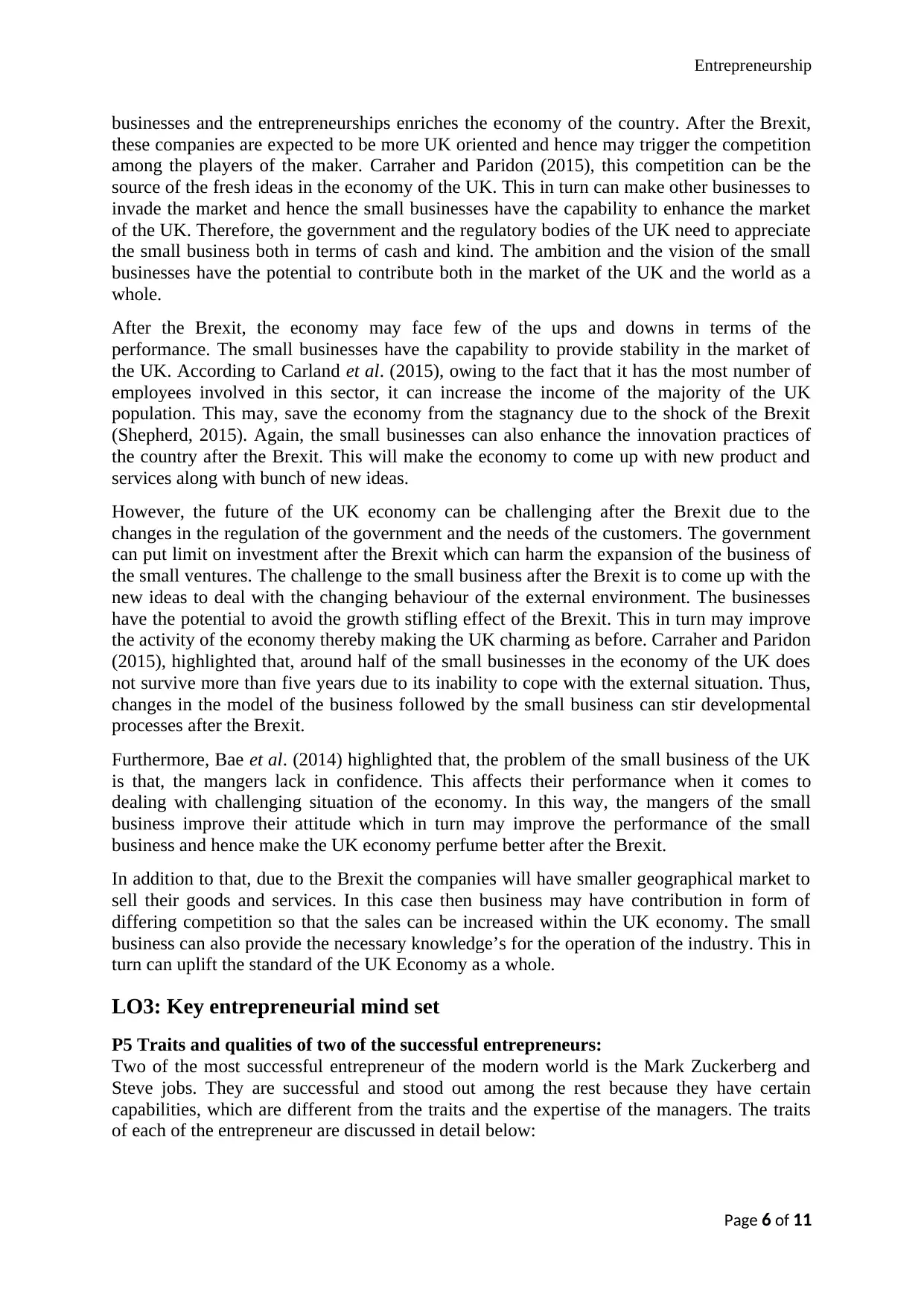
Entrepreneurship
businesses and the entrepreneurships enriches the economy of the country. After the Brexit,
these companies are expected to be more UK oriented and hence may trigger the competition
among the players of the maker. Carraher and Paridon (2015), this competition can be the
source of the fresh ideas in the economy of the UK. This in turn can make other businesses to
invade the market and hence the small businesses have the capability to enhance the market
of the UK. Therefore, the government and the regulatory bodies of the UK need to appreciate
the small business both in terms of cash and kind. The ambition and the vision of the small
businesses have the potential to contribute both in the market of the UK and the world as a
whole.
After the Brexit, the economy may face few of the ups and downs in terms of the
performance. The small businesses have the capability to provide stability in the market of
the UK. According to Carland et al. (2015), owing to the fact that it has the most number of
employees involved in this sector, it can increase the income of the majority of the UK
population. This may, save the economy from the stagnancy due to the shock of the Brexit
(Shepherd, 2015). Again, the small businesses can also enhance the innovation practices of
the country after the Brexit. This will make the economy to come up with new product and
services along with bunch of new ideas.
However, the future of the UK economy can be challenging after the Brexit due to the
changes in the regulation of the government and the needs of the customers. The government
can put limit on investment after the Brexit which can harm the expansion of the business of
the small ventures. The challenge to the small business after the Brexit is to come up with the
new ideas to deal with the changing behaviour of the external environment. The businesses
have the potential to avoid the growth stifling effect of the Brexit. This in turn may improve
the activity of the economy thereby making the UK charming as before. Carraher and Paridon
(2015), highlighted that, around half of the small businesses in the economy of the UK does
not survive more than five years due to its inability to cope with the external situation. Thus,
changes in the model of the business followed by the small business can stir developmental
processes after the Brexit.
Furthermore, Bae et al. (2014) highlighted that, the problem of the small business of the UK
is that, the mangers lack in confidence. This affects their performance when it comes to
dealing with challenging situation of the economy. In this way, the mangers of the small
business improve their attitude which in turn may improve the performance of the small
business and hence make the UK economy perfume better after the Brexit.
In addition to that, due to the Brexit the companies will have smaller geographical market to
sell their goods and services. In this case then business may have contribution in form of
differing competition so that the sales can be increased within the UK economy. The small
business can also provide the necessary knowledge’s for the operation of the industry. This in
turn can uplift the standard of the UK Economy as a whole.
LO3: Key entrepreneurial mind set
P5 Traits and qualities of two of the successful entrepreneurs:
Two of the most successful entrepreneur of the modern world is the Mark Zuckerberg and
Steve jobs. They are successful and stood out among the rest because they have certain
capabilities, which are different from the traits and the expertise of the managers. The traits
of each of the entrepreneur are discussed in detail below:
Page 6 of 11
businesses and the entrepreneurships enriches the economy of the country. After the Brexit,
these companies are expected to be more UK oriented and hence may trigger the competition
among the players of the maker. Carraher and Paridon (2015), this competition can be the
source of the fresh ideas in the economy of the UK. This in turn can make other businesses to
invade the market and hence the small businesses have the capability to enhance the market
of the UK. Therefore, the government and the regulatory bodies of the UK need to appreciate
the small business both in terms of cash and kind. The ambition and the vision of the small
businesses have the potential to contribute both in the market of the UK and the world as a
whole.
After the Brexit, the economy may face few of the ups and downs in terms of the
performance. The small businesses have the capability to provide stability in the market of
the UK. According to Carland et al. (2015), owing to the fact that it has the most number of
employees involved in this sector, it can increase the income of the majority of the UK
population. This may, save the economy from the stagnancy due to the shock of the Brexit
(Shepherd, 2015). Again, the small businesses can also enhance the innovation practices of
the country after the Brexit. This will make the economy to come up with new product and
services along with bunch of new ideas.
However, the future of the UK economy can be challenging after the Brexit due to the
changes in the regulation of the government and the needs of the customers. The government
can put limit on investment after the Brexit which can harm the expansion of the business of
the small ventures. The challenge to the small business after the Brexit is to come up with the
new ideas to deal with the changing behaviour of the external environment. The businesses
have the potential to avoid the growth stifling effect of the Brexit. This in turn may improve
the activity of the economy thereby making the UK charming as before. Carraher and Paridon
(2015), highlighted that, around half of the small businesses in the economy of the UK does
not survive more than five years due to its inability to cope with the external situation. Thus,
changes in the model of the business followed by the small business can stir developmental
processes after the Brexit.
Furthermore, Bae et al. (2014) highlighted that, the problem of the small business of the UK
is that, the mangers lack in confidence. This affects their performance when it comes to
dealing with challenging situation of the economy. In this way, the mangers of the small
business improve their attitude which in turn may improve the performance of the small
business and hence make the UK economy perfume better after the Brexit.
In addition to that, due to the Brexit the companies will have smaller geographical market to
sell their goods and services. In this case then business may have contribution in form of
differing competition so that the sales can be increased within the UK economy. The small
business can also provide the necessary knowledge’s for the operation of the industry. This in
turn can uplift the standard of the UK Economy as a whole.
LO3: Key entrepreneurial mind set
P5 Traits and qualities of two of the successful entrepreneurs:
Two of the most successful entrepreneur of the modern world is the Mark Zuckerberg and
Steve jobs. They are successful and stood out among the rest because they have certain
capabilities, which are different from the traits and the expertise of the managers. The traits
of each of the entrepreneur are discussed in detail below:
Page 6 of 11
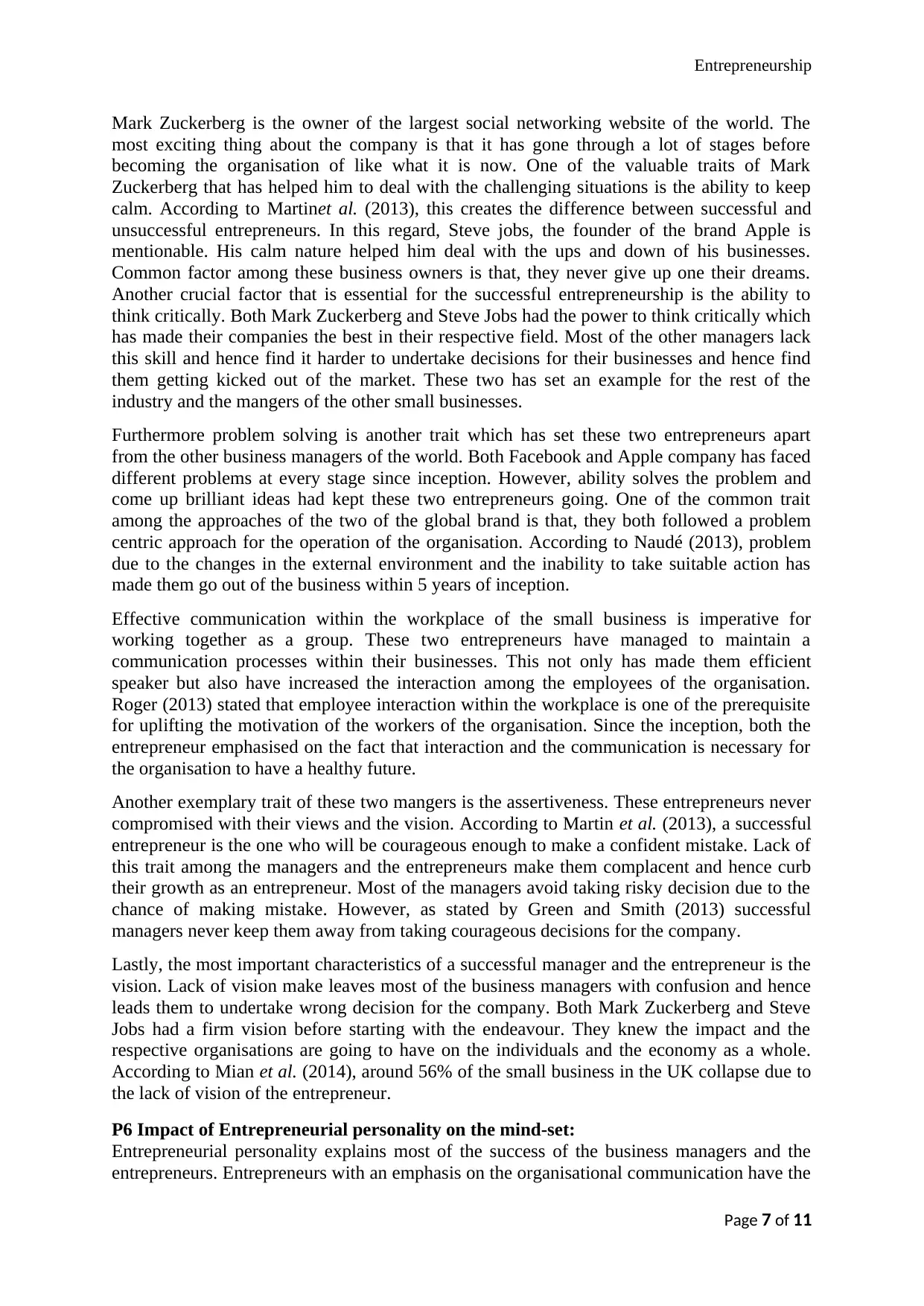
Entrepreneurship
Mark Zuckerberg is the owner of the largest social networking website of the world. The
most exciting thing about the company is that it has gone through a lot of stages before
becoming the organisation of like what it is now. One of the valuable traits of Mark
Zuckerberg that has helped him to deal with the challenging situations is the ability to keep
calm. According to Martinet al. (2013), this creates the difference between successful and
unsuccessful entrepreneurs. In this regard, Steve jobs, the founder of the brand Apple is
mentionable. His calm nature helped him deal with the ups and down of his businesses.
Common factor among these business owners is that, they never give up one their dreams.
Another crucial factor that is essential for the successful entrepreneurship is the ability to
think critically. Both Mark Zuckerberg and Steve Jobs had the power to think critically which
has made their companies the best in their respective field. Most of the other managers lack
this skill and hence find it harder to undertake decisions for their businesses and hence find
them getting kicked out of the market. These two has set an example for the rest of the
industry and the mangers of the other small businesses.
Furthermore problem solving is another trait which has set these two entrepreneurs apart
from the other business managers of the world. Both Facebook and Apple company has faced
different problems at every stage since inception. However, ability solves the problem and
come up brilliant ideas had kept these two entrepreneurs going. One of the common trait
among the approaches of the two of the global brand is that, they both followed a problem
centric approach for the operation of the organisation. According to Naudé (2013), problem
due to the changes in the external environment and the inability to take suitable action has
made them go out of the business within 5 years of inception.
Effective communication within the workplace of the small business is imperative for
working together as a group. These two entrepreneurs have managed to maintain a
communication processes within their businesses. This not only has made them efficient
speaker but also have increased the interaction among the employees of the organisation.
Roger (2013) stated that employee interaction within the workplace is one of the prerequisite
for uplifting the motivation of the workers of the organisation. Since the inception, both the
entrepreneur emphasised on the fact that interaction and the communication is necessary for
the organisation to have a healthy future.
Another exemplary trait of these two mangers is the assertiveness. These entrepreneurs never
compromised with their views and the vision. According to Martin et al. (2013), a successful
entrepreneur is the one who will be courageous enough to make a confident mistake. Lack of
this trait among the managers and the entrepreneurs make them complacent and hence curb
their growth as an entrepreneur. Most of the managers avoid taking risky decision due to the
chance of making mistake. However, as stated by Green and Smith (2013) successful
managers never keep them away from taking courageous decisions for the company.
Lastly, the most important characteristics of a successful manager and the entrepreneur is the
vision. Lack of vision make leaves most of the business managers with confusion and hence
leads them to undertake wrong decision for the company. Both Mark Zuckerberg and Steve
Jobs had a firm vision before starting with the endeavour. They knew the impact and the
respective organisations are going to have on the individuals and the economy as a whole.
According to Mian et al. (2014), around 56% of the small business in the UK collapse due to
the lack of vision of the entrepreneur.
P6 Impact of Entrepreneurial personality on the mind-set:
Entrepreneurial personality explains most of the success of the business managers and the
entrepreneurs. Entrepreneurs with an emphasis on the organisational communication have the
Page 7 of 11
Mark Zuckerberg is the owner of the largest social networking website of the world. The
most exciting thing about the company is that it has gone through a lot of stages before
becoming the organisation of like what it is now. One of the valuable traits of Mark
Zuckerberg that has helped him to deal with the challenging situations is the ability to keep
calm. According to Martinet al. (2013), this creates the difference between successful and
unsuccessful entrepreneurs. In this regard, Steve jobs, the founder of the brand Apple is
mentionable. His calm nature helped him deal with the ups and down of his businesses.
Common factor among these business owners is that, they never give up one their dreams.
Another crucial factor that is essential for the successful entrepreneurship is the ability to
think critically. Both Mark Zuckerberg and Steve Jobs had the power to think critically which
has made their companies the best in their respective field. Most of the other managers lack
this skill and hence find it harder to undertake decisions for their businesses and hence find
them getting kicked out of the market. These two has set an example for the rest of the
industry and the mangers of the other small businesses.
Furthermore problem solving is another trait which has set these two entrepreneurs apart
from the other business managers of the world. Both Facebook and Apple company has faced
different problems at every stage since inception. However, ability solves the problem and
come up brilliant ideas had kept these two entrepreneurs going. One of the common trait
among the approaches of the two of the global brand is that, they both followed a problem
centric approach for the operation of the organisation. According to Naudé (2013), problem
due to the changes in the external environment and the inability to take suitable action has
made them go out of the business within 5 years of inception.
Effective communication within the workplace of the small business is imperative for
working together as a group. These two entrepreneurs have managed to maintain a
communication processes within their businesses. This not only has made them efficient
speaker but also have increased the interaction among the employees of the organisation.
Roger (2013) stated that employee interaction within the workplace is one of the prerequisite
for uplifting the motivation of the workers of the organisation. Since the inception, both the
entrepreneur emphasised on the fact that interaction and the communication is necessary for
the organisation to have a healthy future.
Another exemplary trait of these two mangers is the assertiveness. These entrepreneurs never
compromised with their views and the vision. According to Martin et al. (2013), a successful
entrepreneur is the one who will be courageous enough to make a confident mistake. Lack of
this trait among the managers and the entrepreneurs make them complacent and hence curb
their growth as an entrepreneur. Most of the managers avoid taking risky decision due to the
chance of making mistake. However, as stated by Green and Smith (2013) successful
managers never keep them away from taking courageous decisions for the company.
Lastly, the most important characteristics of a successful manager and the entrepreneur is the
vision. Lack of vision make leaves most of the business managers with confusion and hence
leads them to undertake wrong decision for the company. Both Mark Zuckerberg and Steve
Jobs had a firm vision before starting with the endeavour. They knew the impact and the
respective organisations are going to have on the individuals and the economy as a whole.
According to Mian et al. (2014), around 56% of the small business in the UK collapse due to
the lack of vision of the entrepreneur.
P6 Impact of Entrepreneurial personality on the mind-set:
Entrepreneurial personality explains most of the success of the business managers and the
entrepreneurs. Entrepreneurs with an emphasis on the organisational communication have the
Page 7 of 11
Paraphrase This Document
Need a fresh take? Get an instant paraphrase of this document with our AI Paraphraser
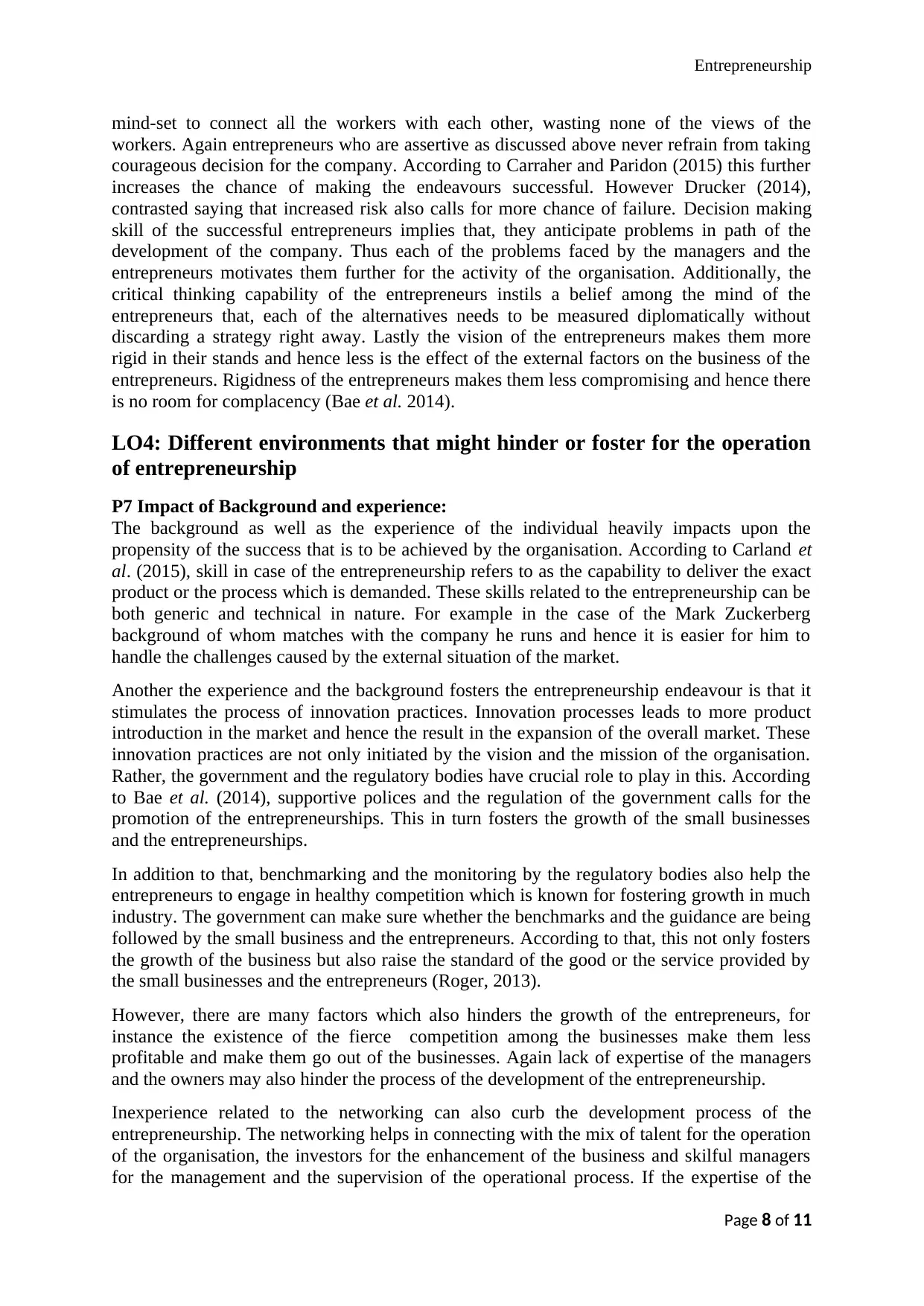
Entrepreneurship
mind-set to connect all the workers with each other, wasting none of the views of the
workers. Again entrepreneurs who are assertive as discussed above never refrain from taking
courageous decision for the company. According to Carraher and Paridon (2015) this further
increases the chance of making the endeavours successful. However Drucker (2014),
contrasted saying that increased risk also calls for more chance of failure. Decision making
skill of the successful entrepreneurs implies that, they anticipate problems in path of the
development of the company. Thus each of the problems faced by the managers and the
entrepreneurs motivates them further for the activity of the organisation. Additionally, the
critical thinking capability of the entrepreneurs instils a belief among the mind of the
entrepreneurs that, each of the alternatives needs to be measured diplomatically without
discarding a strategy right away. Lastly the vision of the entrepreneurs makes them more
rigid in their stands and hence less is the effect of the external factors on the business of the
entrepreneurs. Rigidness of the entrepreneurs makes them less compromising and hence there
is no room for complacency (Bae et al. 2014).
LO4: Different environments that might hinder or foster for the operation
of entrepreneurship
P7 Impact of Background and experience:
The background as well as the experience of the individual heavily impacts upon the
propensity of the success that is to be achieved by the organisation. According to Carland et
al. (2015), skill in case of the entrepreneurship refers to as the capability to deliver the exact
product or the process which is demanded. These skills related to the entrepreneurship can be
both generic and technical in nature. For example in the case of the Mark Zuckerberg
background of whom matches with the company he runs and hence it is easier for him to
handle the challenges caused by the external situation of the market.
Another the experience and the background fosters the entrepreneurship endeavour is that it
stimulates the process of innovation practices. Innovation processes leads to more product
introduction in the market and hence the result in the expansion of the overall market. These
innovation practices are not only initiated by the vision and the mission of the organisation.
Rather, the government and the regulatory bodies have crucial role to play in this. According
to Bae et al. (2014), supportive polices and the regulation of the government calls for the
promotion of the entrepreneurships. This in turn fosters the growth of the small businesses
and the entrepreneurships.
In addition to that, benchmarking and the monitoring by the regulatory bodies also help the
entrepreneurs to engage in healthy competition which is known for fostering growth in much
industry. The government can make sure whether the benchmarks and the guidance are being
followed by the small business and the entrepreneurs. According to that, this not only fosters
the growth of the business but also raise the standard of the good or the service provided by
the small businesses and the entrepreneurs (Roger, 2013).
However, there are many factors which also hinders the growth of the entrepreneurs, for
instance the existence of the fierce competition among the businesses make them less
profitable and make them go out of the businesses. Again lack of expertise of the managers
and the owners may also hinder the process of the development of the entrepreneurship.
Inexperience related to the networking can also curb the development process of the
entrepreneurship. The networking helps in connecting with the mix of talent for the operation
of the organisation, the investors for the enhancement of the business and skilful managers
for the management and the supervision of the operational process. If the expertise of the
Page 8 of 11
mind-set to connect all the workers with each other, wasting none of the views of the
workers. Again entrepreneurs who are assertive as discussed above never refrain from taking
courageous decision for the company. According to Carraher and Paridon (2015) this further
increases the chance of making the endeavours successful. However Drucker (2014),
contrasted saying that increased risk also calls for more chance of failure. Decision making
skill of the successful entrepreneurs implies that, they anticipate problems in path of the
development of the company. Thus each of the problems faced by the managers and the
entrepreneurs motivates them further for the activity of the organisation. Additionally, the
critical thinking capability of the entrepreneurs instils a belief among the mind of the
entrepreneurs that, each of the alternatives needs to be measured diplomatically without
discarding a strategy right away. Lastly the vision of the entrepreneurs makes them more
rigid in their stands and hence less is the effect of the external factors on the business of the
entrepreneurs. Rigidness of the entrepreneurs makes them less compromising and hence there
is no room for complacency (Bae et al. 2014).
LO4: Different environments that might hinder or foster for the operation
of entrepreneurship
P7 Impact of Background and experience:
The background as well as the experience of the individual heavily impacts upon the
propensity of the success that is to be achieved by the organisation. According to Carland et
al. (2015), skill in case of the entrepreneurship refers to as the capability to deliver the exact
product or the process which is demanded. These skills related to the entrepreneurship can be
both generic and technical in nature. For example in the case of the Mark Zuckerberg
background of whom matches with the company he runs and hence it is easier for him to
handle the challenges caused by the external situation of the market.
Another the experience and the background fosters the entrepreneurship endeavour is that it
stimulates the process of innovation practices. Innovation processes leads to more product
introduction in the market and hence the result in the expansion of the overall market. These
innovation practices are not only initiated by the vision and the mission of the organisation.
Rather, the government and the regulatory bodies have crucial role to play in this. According
to Bae et al. (2014), supportive polices and the regulation of the government calls for the
promotion of the entrepreneurships. This in turn fosters the growth of the small businesses
and the entrepreneurships.
In addition to that, benchmarking and the monitoring by the regulatory bodies also help the
entrepreneurs to engage in healthy competition which is known for fostering growth in much
industry. The government can make sure whether the benchmarks and the guidance are being
followed by the small business and the entrepreneurs. According to that, this not only fosters
the growth of the business but also raise the standard of the good or the service provided by
the small businesses and the entrepreneurs (Roger, 2013).
However, there are many factors which also hinders the growth of the entrepreneurs, for
instance the existence of the fierce competition among the businesses make them less
profitable and make them go out of the businesses. Again lack of expertise of the managers
and the owners may also hinder the process of the development of the entrepreneurship.
Inexperience related to the networking can also curb the development process of the
entrepreneurship. The networking helps in connecting with the mix of talent for the operation
of the organisation, the investors for the enhancement of the business and skilful managers
for the management and the supervision of the operational process. If the expertise of the
Page 8 of 11
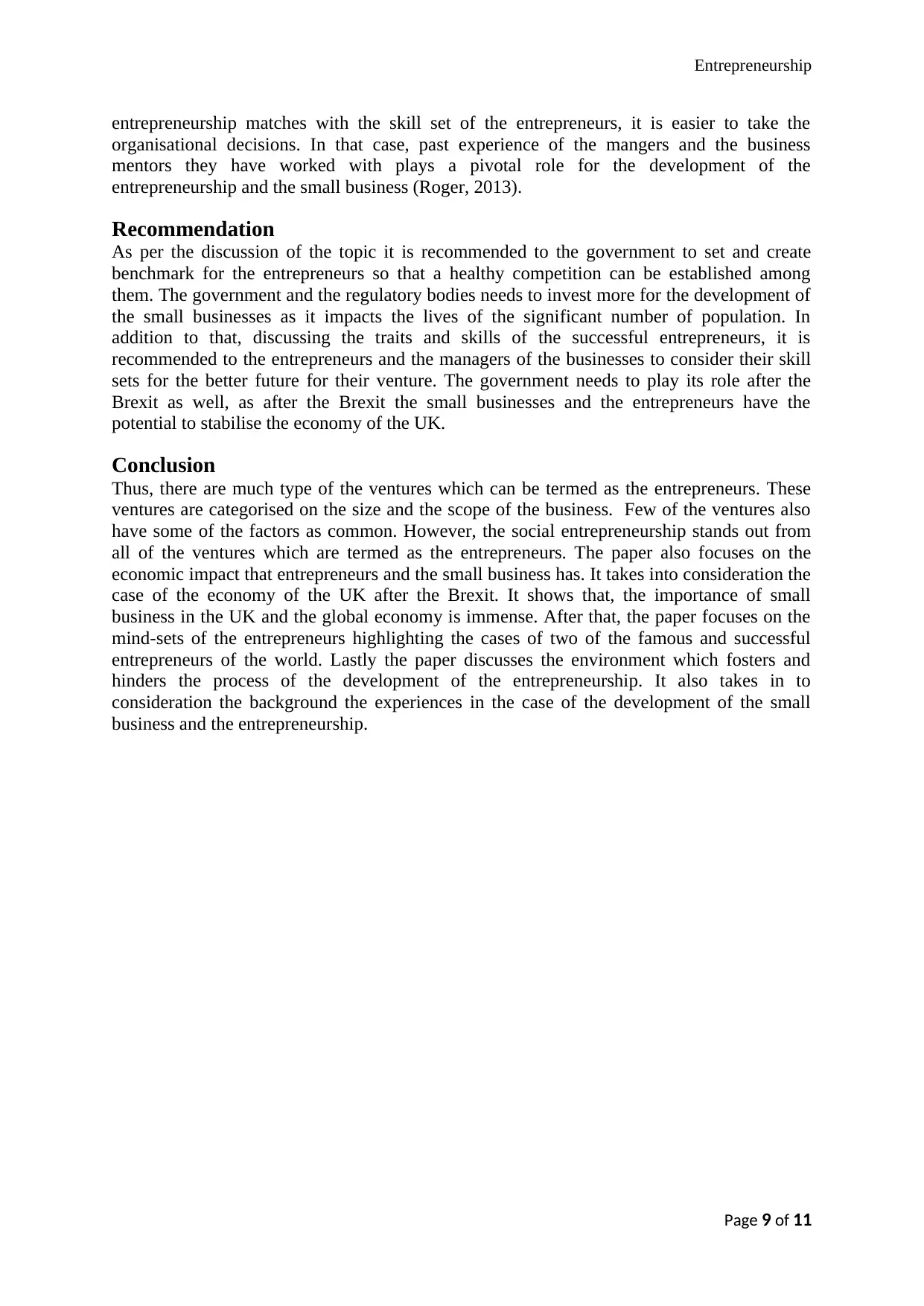
Entrepreneurship
entrepreneurship matches with the skill set of the entrepreneurs, it is easier to take the
organisational decisions. In that case, past experience of the mangers and the business
mentors they have worked with plays a pivotal role for the development of the
entrepreneurship and the small business (Roger, 2013).
Recommendation
As per the discussion of the topic it is recommended to the government to set and create
benchmark for the entrepreneurs so that a healthy competition can be established among
them. The government and the regulatory bodies needs to invest more for the development of
the small businesses as it impacts the lives of the significant number of population. In
addition to that, discussing the traits and skills of the successful entrepreneurs, it is
recommended to the entrepreneurs and the managers of the businesses to consider their skill
sets for the better future for their venture. The government needs to play its role after the
Brexit as well, as after the Brexit the small businesses and the entrepreneurs have the
potential to stabilise the economy of the UK.
Conclusion
Thus, there are much type of the ventures which can be termed as the entrepreneurs. These
ventures are categorised on the size and the scope of the business. Few of the ventures also
have some of the factors as common. However, the social entrepreneurship stands out from
all of the ventures which are termed as the entrepreneurs. The paper also focuses on the
economic impact that entrepreneurs and the small business has. It takes into consideration the
case of the economy of the UK after the Brexit. It shows that, the importance of small
business in the UK and the global economy is immense. After that, the paper focuses on the
mind-sets of the entrepreneurs highlighting the cases of two of the famous and successful
entrepreneurs of the world. Lastly the paper discusses the environment which fosters and
hinders the process of the development of the entrepreneurship. It also takes in to
consideration the background the experiences in the case of the development of the small
business and the entrepreneurship.
Page 9 of 11
entrepreneurship matches with the skill set of the entrepreneurs, it is easier to take the
organisational decisions. In that case, past experience of the mangers and the business
mentors they have worked with plays a pivotal role for the development of the
entrepreneurship and the small business (Roger, 2013).
Recommendation
As per the discussion of the topic it is recommended to the government to set and create
benchmark for the entrepreneurs so that a healthy competition can be established among
them. The government and the regulatory bodies needs to invest more for the development of
the small businesses as it impacts the lives of the significant number of population. In
addition to that, discussing the traits and skills of the successful entrepreneurs, it is
recommended to the entrepreneurs and the managers of the businesses to consider their skill
sets for the better future for their venture. The government needs to play its role after the
Brexit as well, as after the Brexit the small businesses and the entrepreneurs have the
potential to stabilise the economy of the UK.
Conclusion
Thus, there are much type of the ventures which can be termed as the entrepreneurs. These
ventures are categorised on the size and the scope of the business. Few of the ventures also
have some of the factors as common. However, the social entrepreneurship stands out from
all of the ventures which are termed as the entrepreneurs. The paper also focuses on the
economic impact that entrepreneurs and the small business has. It takes into consideration the
case of the economy of the UK after the Brexit. It shows that, the importance of small
business in the UK and the global economy is immense. After that, the paper focuses on the
mind-sets of the entrepreneurs highlighting the cases of two of the famous and successful
entrepreneurs of the world. Lastly the paper discusses the environment which fosters and
hinders the process of the development of the entrepreneurship. It also takes in to
consideration the background the experiences in the case of the development of the small
business and the entrepreneurship.
Page 9 of 11
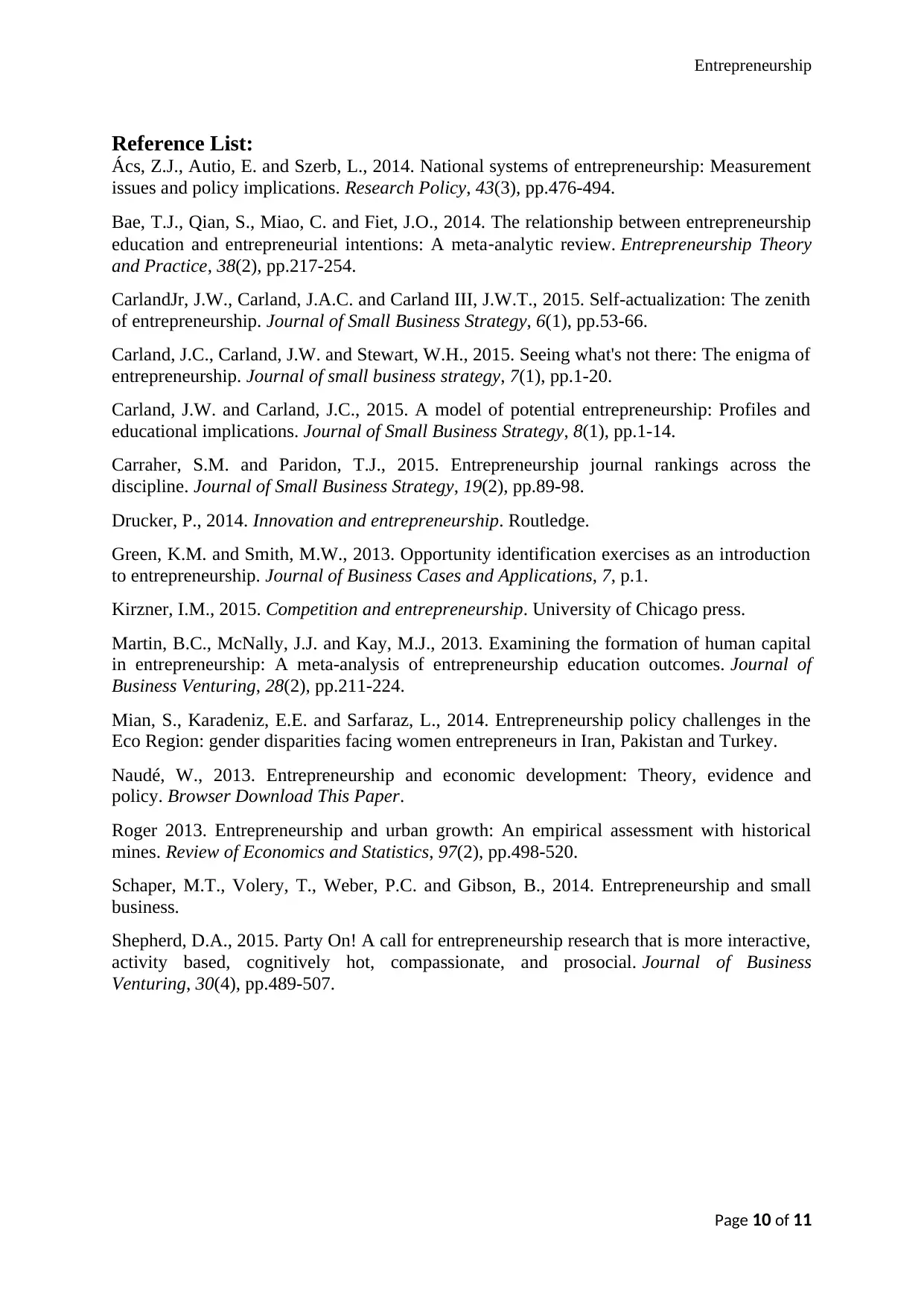
Entrepreneurship
Reference List:
Ács, Z.J., Autio, E. and Szerb, L., 2014. National systems of entrepreneurship: Measurement
issues and policy implications. Research Policy, 43(3), pp.476-494.
Bae, T.J., Qian, S., Miao, C. and Fiet, J.O., 2014. The relationship between entrepreneurship
education and entrepreneurial intentions: A meta‐analytic review. Entrepreneurship Theory
and Practice, 38(2), pp.217-254.
CarlandJr, J.W., Carland, J.A.C. and Carland III, J.W.T., 2015. Self-actualization: The zenith
of entrepreneurship. Journal of Small Business Strategy, 6(1), pp.53-66.
Carland, J.C., Carland, J.W. and Stewart, W.H., 2015. Seeing what's not there: The enigma of
entrepreneurship. Journal of small business strategy, 7(1), pp.1-20.
Carland, J.W. and Carland, J.C., 2015. A model of potential entrepreneurship: Profiles and
educational implications. Journal of Small Business Strategy, 8(1), pp.1-14.
Carraher, S.M. and Paridon, T.J., 2015. Entrepreneurship journal rankings across the
discipline. Journal of Small Business Strategy, 19(2), pp.89-98.
Drucker, P., 2014. Innovation and entrepreneurship. Routledge.
Green, K.M. and Smith, M.W., 2013. Opportunity identification exercises as an introduction
to entrepreneurship. Journal of Business Cases and Applications, 7, p.1.
Kirzner, I.M., 2015. Competition and entrepreneurship. University of Chicago press.
Martin, B.C., McNally, J.J. and Kay, M.J., 2013. Examining the formation of human capital
in entrepreneurship: A meta-analysis of entrepreneurship education outcomes. Journal of
Business Venturing, 28(2), pp.211-224.
Mian, S., Karadeniz, E.E. and Sarfaraz, L., 2014. Entrepreneurship policy challenges in the
Eco Region: gender disparities facing women entrepreneurs in Iran, Pakistan and Turkey.
Naudé, W., 2013. Entrepreneurship and economic development: Theory, evidence and
policy. Browser Download This Paper.
Roger 2013. Entrepreneurship and urban growth: An empirical assessment with historical
mines. Review of Economics and Statistics, 97(2), pp.498-520.
Schaper, M.T., Volery, T., Weber, P.C. and Gibson, B., 2014. Entrepreneurship and small
business.
Shepherd, D.A., 2015. Party On! A call for entrepreneurship research that is more interactive,
activity based, cognitively hot, compassionate, and prosocial. Journal of Business
Venturing, 30(4), pp.489-507.
Page 10 of 11
Reference List:
Ács, Z.J., Autio, E. and Szerb, L., 2014. National systems of entrepreneurship: Measurement
issues and policy implications. Research Policy, 43(3), pp.476-494.
Bae, T.J., Qian, S., Miao, C. and Fiet, J.O., 2014. The relationship between entrepreneurship
education and entrepreneurial intentions: A meta‐analytic review. Entrepreneurship Theory
and Practice, 38(2), pp.217-254.
CarlandJr, J.W., Carland, J.A.C. and Carland III, J.W.T., 2015. Self-actualization: The zenith
of entrepreneurship. Journal of Small Business Strategy, 6(1), pp.53-66.
Carland, J.C., Carland, J.W. and Stewart, W.H., 2015. Seeing what's not there: The enigma of
entrepreneurship. Journal of small business strategy, 7(1), pp.1-20.
Carland, J.W. and Carland, J.C., 2015. A model of potential entrepreneurship: Profiles and
educational implications. Journal of Small Business Strategy, 8(1), pp.1-14.
Carraher, S.M. and Paridon, T.J., 2015. Entrepreneurship journal rankings across the
discipline. Journal of Small Business Strategy, 19(2), pp.89-98.
Drucker, P., 2014. Innovation and entrepreneurship. Routledge.
Green, K.M. and Smith, M.W., 2013. Opportunity identification exercises as an introduction
to entrepreneurship. Journal of Business Cases and Applications, 7, p.1.
Kirzner, I.M., 2015. Competition and entrepreneurship. University of Chicago press.
Martin, B.C., McNally, J.J. and Kay, M.J., 2013. Examining the formation of human capital
in entrepreneurship: A meta-analysis of entrepreneurship education outcomes. Journal of
Business Venturing, 28(2), pp.211-224.
Mian, S., Karadeniz, E.E. and Sarfaraz, L., 2014. Entrepreneurship policy challenges in the
Eco Region: gender disparities facing women entrepreneurs in Iran, Pakistan and Turkey.
Naudé, W., 2013. Entrepreneurship and economic development: Theory, evidence and
policy. Browser Download This Paper.
Roger 2013. Entrepreneurship and urban growth: An empirical assessment with historical
mines. Review of Economics and Statistics, 97(2), pp.498-520.
Schaper, M.T., Volery, T., Weber, P.C. and Gibson, B., 2014. Entrepreneurship and small
business.
Shepherd, D.A., 2015. Party On! A call for entrepreneurship research that is more interactive,
activity based, cognitively hot, compassionate, and prosocial. Journal of Business
Venturing, 30(4), pp.489-507.
Page 10 of 11
Secure Best Marks with AI Grader
Need help grading? Try our AI Grader for instant feedback on your assignments.
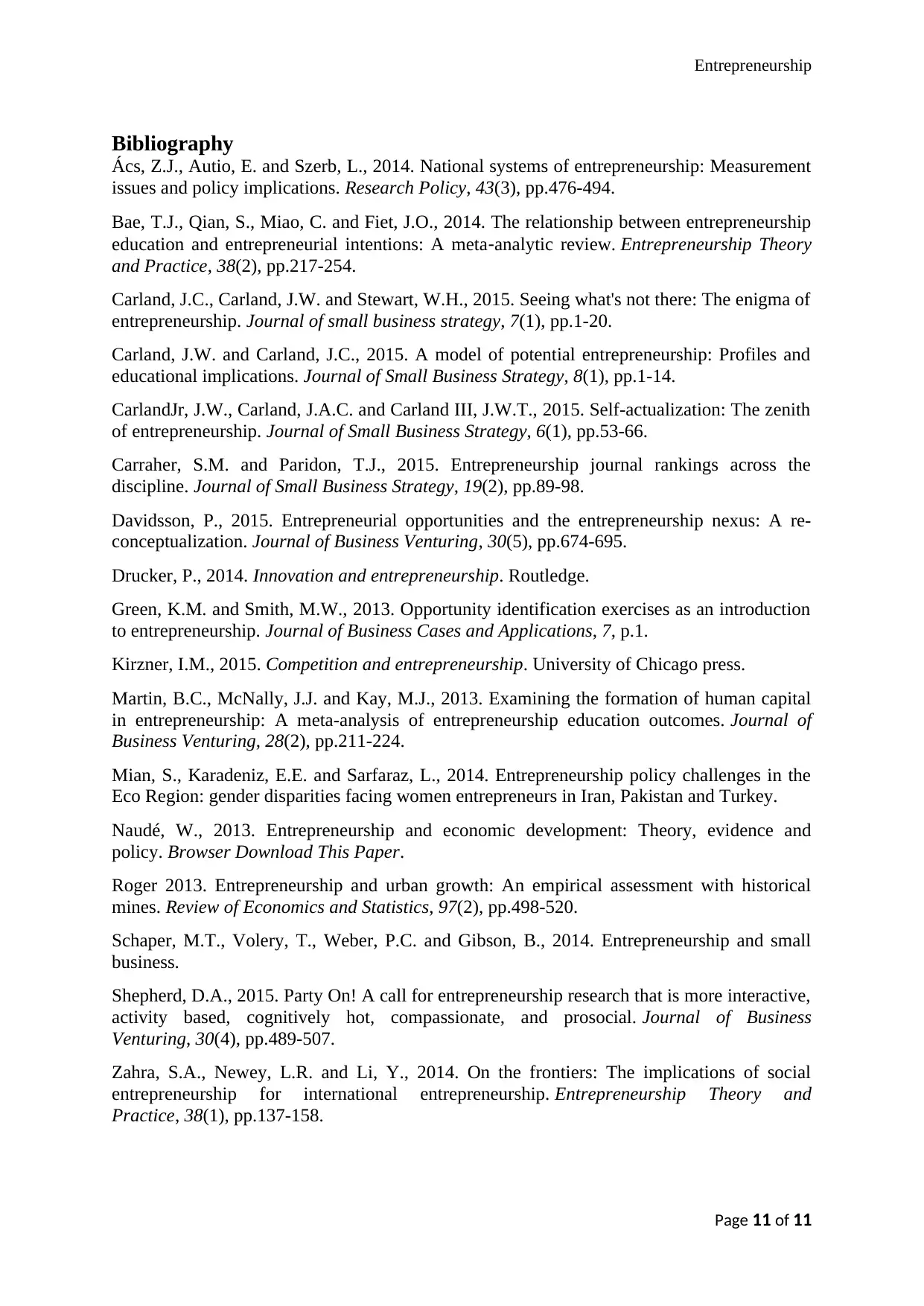
Entrepreneurship
Bibliography
Ács, Z.J., Autio, E. and Szerb, L., 2014. National systems of entrepreneurship: Measurement
issues and policy implications. Research Policy, 43(3), pp.476-494.
Bae, T.J., Qian, S., Miao, C. and Fiet, J.O., 2014. The relationship between entrepreneurship
education and entrepreneurial intentions: A meta‐analytic review. Entrepreneurship Theory
and Practice, 38(2), pp.217-254.
Carland, J.C., Carland, J.W. and Stewart, W.H., 2015. Seeing what's not there: The enigma of
entrepreneurship. Journal of small business strategy, 7(1), pp.1-20.
Carland, J.W. and Carland, J.C., 2015. A model of potential entrepreneurship: Profiles and
educational implications. Journal of Small Business Strategy, 8(1), pp.1-14.
CarlandJr, J.W., Carland, J.A.C. and Carland III, J.W.T., 2015. Self-actualization: The zenith
of entrepreneurship. Journal of Small Business Strategy, 6(1), pp.53-66.
Carraher, S.M. and Paridon, T.J., 2015. Entrepreneurship journal rankings across the
discipline. Journal of Small Business Strategy, 19(2), pp.89-98.
Davidsson, P., 2015. Entrepreneurial opportunities and the entrepreneurship nexus: A re-
conceptualization. Journal of Business Venturing, 30(5), pp.674-695.
Drucker, P., 2014. Innovation and entrepreneurship. Routledge.
Green, K.M. and Smith, M.W., 2013. Opportunity identification exercises as an introduction
to entrepreneurship. Journal of Business Cases and Applications, 7, p.1.
Kirzner, I.M., 2015. Competition and entrepreneurship. University of Chicago press.
Martin, B.C., McNally, J.J. and Kay, M.J., 2013. Examining the formation of human capital
in entrepreneurship: A meta-analysis of entrepreneurship education outcomes. Journal of
Business Venturing, 28(2), pp.211-224.
Mian, S., Karadeniz, E.E. and Sarfaraz, L., 2014. Entrepreneurship policy challenges in the
Eco Region: gender disparities facing women entrepreneurs in Iran, Pakistan and Turkey.
Naudé, W., 2013. Entrepreneurship and economic development: Theory, evidence and
policy. Browser Download This Paper.
Roger 2013. Entrepreneurship and urban growth: An empirical assessment with historical
mines. Review of Economics and Statistics, 97(2), pp.498-520.
Schaper, M.T., Volery, T., Weber, P.C. and Gibson, B., 2014. Entrepreneurship and small
business.
Shepherd, D.A., 2015. Party On! A call for entrepreneurship research that is more interactive,
activity based, cognitively hot, compassionate, and prosocial. Journal of Business
Venturing, 30(4), pp.489-507.
Zahra, S.A., Newey, L.R. and Li, Y., 2014. On the frontiers: The implications of social
entrepreneurship for international entrepreneurship. Entrepreneurship Theory and
Practice, 38(1), pp.137-158.
Page 11 of 11
Bibliography
Ács, Z.J., Autio, E. and Szerb, L., 2014. National systems of entrepreneurship: Measurement
issues and policy implications. Research Policy, 43(3), pp.476-494.
Bae, T.J., Qian, S., Miao, C. and Fiet, J.O., 2014. The relationship between entrepreneurship
education and entrepreneurial intentions: A meta‐analytic review. Entrepreneurship Theory
and Practice, 38(2), pp.217-254.
Carland, J.C., Carland, J.W. and Stewart, W.H., 2015. Seeing what's not there: The enigma of
entrepreneurship. Journal of small business strategy, 7(1), pp.1-20.
Carland, J.W. and Carland, J.C., 2015. A model of potential entrepreneurship: Profiles and
educational implications. Journal of Small Business Strategy, 8(1), pp.1-14.
CarlandJr, J.W., Carland, J.A.C. and Carland III, J.W.T., 2015. Self-actualization: The zenith
of entrepreneurship. Journal of Small Business Strategy, 6(1), pp.53-66.
Carraher, S.M. and Paridon, T.J., 2015. Entrepreneurship journal rankings across the
discipline. Journal of Small Business Strategy, 19(2), pp.89-98.
Davidsson, P., 2015. Entrepreneurial opportunities and the entrepreneurship nexus: A re-
conceptualization. Journal of Business Venturing, 30(5), pp.674-695.
Drucker, P., 2014. Innovation and entrepreneurship. Routledge.
Green, K.M. and Smith, M.W., 2013. Opportunity identification exercises as an introduction
to entrepreneurship. Journal of Business Cases and Applications, 7, p.1.
Kirzner, I.M., 2015. Competition and entrepreneurship. University of Chicago press.
Martin, B.C., McNally, J.J. and Kay, M.J., 2013. Examining the formation of human capital
in entrepreneurship: A meta-analysis of entrepreneurship education outcomes. Journal of
Business Venturing, 28(2), pp.211-224.
Mian, S., Karadeniz, E.E. and Sarfaraz, L., 2014. Entrepreneurship policy challenges in the
Eco Region: gender disparities facing women entrepreneurs in Iran, Pakistan and Turkey.
Naudé, W., 2013. Entrepreneurship and economic development: Theory, evidence and
policy. Browser Download This Paper.
Roger 2013. Entrepreneurship and urban growth: An empirical assessment with historical
mines. Review of Economics and Statistics, 97(2), pp.498-520.
Schaper, M.T., Volery, T., Weber, P.C. and Gibson, B., 2014. Entrepreneurship and small
business.
Shepherd, D.A., 2015. Party On! A call for entrepreneurship research that is more interactive,
activity based, cognitively hot, compassionate, and prosocial. Journal of Business
Venturing, 30(4), pp.489-507.
Zahra, S.A., Newey, L.R. and Li, Y., 2014. On the frontiers: The implications of social
entrepreneurship for international entrepreneurship. Entrepreneurship Theory and
Practice, 38(1), pp.137-158.
Page 11 of 11
1 out of 11
Related Documents
Your All-in-One AI-Powered Toolkit for Academic Success.
+13062052269
info@desklib.com
Available 24*7 on WhatsApp / Email
![[object Object]](/_next/static/media/star-bottom.7253800d.svg)
Unlock your academic potential
© 2024 | Zucol Services PVT LTD | All rights reserved.





